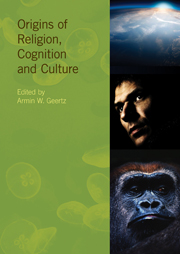Book contents
- Frontmatter
- Contents
- Contributors
- Introduction
- Part I EVOLUTIONARY SCENARIOS
- Part II COGNITIVE THEORIES
- 11 Cognition and meaning
- 12 Wittgenstein and the naturalness of religious belief
- 13 “Peekaboo!” and object permanence: on the play of concealment and appearance in cognition and religion
- 14 Yogācāra Buddhist views on the causal relation between language, cognition and the evolution of worlds
- 15 A resource model of religious cognition: motivation as a primary determinant for the complexity of supernatural agency representations
- 16 The recognition of religion: archaeological diagnosis and implicit theorizing
- 17 Religion and the extra-somatics of conceptual thought
- 18 Tools for thought: the ritual use of ordinary tools
- 19 Care of the soul: empathy in dualistic worldview
- 20 From corpse to concept: a cognitive theory on the ritualized treatment of dead bodies
- 21 Anthropomorphism in god concepts: the role of narrative
- Index
19 - Care of the soul: empathy in dualistic worldview
from Part II - COGNITIVE THEORIES
- Frontmatter
- Contents
- Contributors
- Introduction
- Part I EVOLUTIONARY SCENARIOS
- Part II COGNITIVE THEORIES
- 11 Cognition and meaning
- 12 Wittgenstein and the naturalness of religious belief
- 13 “Peekaboo!” and object permanence: on the play of concealment and appearance in cognition and religion
- 14 Yogācāra Buddhist views on the causal relation between language, cognition and the evolution of worlds
- 15 A resource model of religious cognition: motivation as a primary determinant for the complexity of supernatural agency representations
- 16 The recognition of religion: archaeological diagnosis and implicit theorizing
- 17 Religion and the extra-somatics of conceptual thought
- 18 Tools for thought: the ritual use of ordinary tools
- 19 Care of the soul: empathy in dualistic worldview
- 20 From corpse to concept: a cognitive theory on the ritualized treatment of dead bodies
- 21 Anthropomorphism in god concepts: the role of narrative
- Index
Summary
One particularly fascinating (for me, anyway) realization that has come from the cognitive sciences is that we have not necessarily evolved to have an accurate understanding of the way other people think. We have not even evolved to have an accurate understanding of the way we think. The question of which came first — our misunderstanding of ourselves or our misunderstanding of others — is kind of a “chicken and egg” question, but this chapter is going to come down on the side of the former. Leslie Orgel's second law is “evolution is smarter than you”. The truth about the brain is complicated and rather frightening to a lot of people. If human beings came with the innate desire to know and capacity to easily understand the way our brains actually work, it is not likely that we would have survived very long (not even to address the question of what would have naturally selected such an ability into existence in the first place). When you think about it, Mother Nature was pretty smart not to burden us with that knowledge.
Some propositions:
The cognitive sciences reveal truths about human thought and behaviour which are massively counterintuitive, contrary to “common-sense” thinking.
Theory of mind (ToM) is a “common-sense” capacity. It does not necessarily lead us to accurate conclusions about the thinking of others, or even ourselves. […]
- Type
- Chapter
- Information
- Origins of Religion, Cognition and Culture , pp. 365 - 373Publisher: Acumen PublishingPrint publication year: 2013

